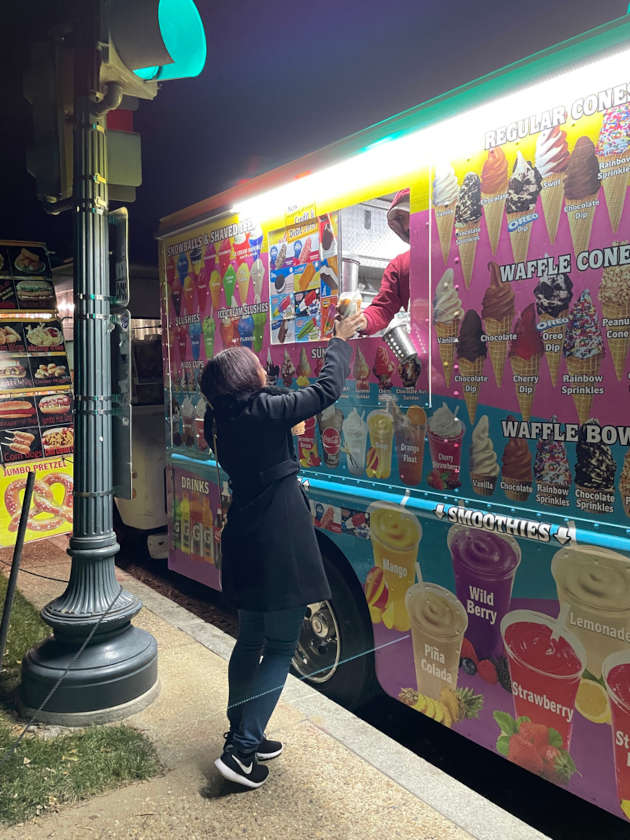A graduate student at the Naveen Jindal School of Management looks forward to a promising future in entrepreneurship, having recently won three competitions — and taking home $35,000 in cash and prizes in the process.

Mercedes Johnson, BA’19, a student in the Professional MBA Evening Cohort program whose concentration is in innovation and entrepreneurship, recently took one of two prizes in the UTDesign competition, won one of two Texas Business Hall of Fame Scholar Awards and was runner up in the student track of the Big Idea Competition, UT Dallas’ signature startup competition.
Anyone who gets to know Johnson might not be surprised about her recent run of success. Johnson holds two bachelor’s degrees — one from Texas State University in mass communication with a minor in art and design, and another from The University of Texas at Dallas in arts technology communication and media. Her original intention was to be a news reporter. She had done a couple of internships toward that career path but did not like the time commitment required of a journalist in exchange for the compensation she received. Also, she did not enjoy the emotional demands of the job, comparing it to a ride on a rollercoaster.
“I remember one day I was covering a San Antonio Spurs game and then the next day at 12 o’clock in the morning there was a mass shooting,” she said. “The pay was not great. When I graduated, I had job offers but I just couldn’t go through with it.”
Since she had been attracted to the animation aspects of her art and design minor at Texas State, she decided to pursue a second degree at UT Dallas. After her first course in animation, she knew that path was not for her. She took an elective course in design experience and was captivated by it.
“It was so much fun,” she said. “I enjoyed it from start to finish — I hopped on an outside project called ThoughtNav and we worked on a product for an outside partner which turned into my capstone project. I ended up getting runner up in the capstone competition. I was loving it. Then I did an internship as a UX (user-experience) designer and it all kind of tumbled into my career.”
When she graduated, she started her career as a UX designer for the real estate firm CBRE. Less than two years later, she found a position as a principal UX designer at Capital One.
“I’ve always had just aspirations of climbing the corporate ladder,” she said. “I took a look at the design career ladder and I noticed there was a glass ceiling that I wouldn’t be able to break. That’s why I went back to school — because I didn’t want to hit that glass ceiling and be stuck. I have already moved up from an intern to a designer and I passed senior designer and now I’m a principal designer. I’ve only been working for three years and I already saw myself hitting that ceiling fairly quickly. That’s why I enrolled in the MBA program at the Jindal School. I figured an MBA would open more doors to larger management positions, VPs and things like that.”
While applying for the MBA program, she learned about the innovation and entrepreneurship programs that UT Dallas had to offer. That opened her eyes to a whole new world.
From the first semester, she was “all-in,” as she put it. She enrolled in the CometX Accelerator program offered by UT Dallas’ Institute for Innovation and Entrepreneurship.
“Marketing was one thing that I realized I don’t know how to do,” she said. “And that’s the most important part of entrepreneurship. You can have an amazing idea, but if you don’t know how to sell it or market it, it doesn’t matter.”
Her solution? Add an MS in Marketing to her already heavy MBA student workload, along with her full-time job at Capital One. When asked if she ever sleeps, she said, “not a lick.”
When Johnson started the CometX program, she was under the impression that she would be provided with an idea for a startup business and that she would practice how to build it out.
“But that’s not what happened,” she said. “I got there and they’re like, ‘what’s your idea?’ I was like, ‘Oh, no! Give me a week.’”
Over the next few days, she frantically brainstormed business ideas. She thought of doing something related to the necessities of life — food, clothing and shelter. She quickly ruled out real estate and clothing design, which left food. Her ideation process went from starting a vegan restaurant chain to building a ghost kitchen app.
“The idea was that you could get food from different ghost kitchens,” she said. “Then I realized, ‘Oh, wait — COVID-19. That’s a problem; it’s not going to work.’ I thought, ‘OK, what’s cleaner? What’s mobile and is going to meet standards?’”

Then an idea hit her: food trucks.
“I finally found the community that I was going to hone in on,” she said.
She started doing research about the problems food-truck businesses face and then cold called food truck owners in the area.
“I told them, ‘Hey, I’m a student,” she said. “I just want to know about your business. Can you tell me more?”
She learned that making connections was difficult for many of the food-truck owners during a pandemic. Restaurants were struggling, too. Delivery apps were filling a void but the food truck industry did not have one.
“I was like, ‘OK,’” she said. “I’m a designer. I can do some sort of technical solution. Let me find a way to solve their problems and be able to leverage my skill set. That’s how I came up with Food Magnet.”
She enrolled in an Innovation and Entrepreneurship class (ENTP 6370) taught by Jackie Kimzey, an associate professor of practice in the Organizations, Strategy and International Management academic area. In that class, she realized that there is a lot of crossover between UX, design and entrepreneurship.
“In starting a business, like in the design process, we begin by interviewing, figuring out what the problem is,” she said. “It’s the same work stream; it’s just called a different thing.”
Next, Johnson applied for the Big Idea Competition. While she was going through that process, Dresden Goldberg, director of programs and operations at the institute, told her about the UTDesign competition. The primary requirement was that she bring a technical solution to a problem, which Johnson was certain she had with Food Magnet.
To top off Johnson’s competition slate, Goldberg nominated her for the Texas Business Hall of Fame Scholar Awards. She applied for and won one of two $15,000 Mitchell Family Foundation Awards. She also won one of two UTDesign awards presented at the Big Idea Competition worth $15,000 of coding services for two semesters and $5,000 cash for business expenses.
The coding services for Food Magnet will be performed under the umbrella of UTDesign, the senior capstone experience for computer science majors — much like UTDsolv, the senior capstone experience for Jindal School undergraduates.
Along with completing the course work for two master’s degrees and perhaps entering a couple more competitions, Johnson’s immediate plan is to use her winnings to hire a CTO for Food Magnet, complete the app development so that she can do a soft launch with a pilot program this summer. With what’s left of the award money, she plans to do a marketing campaign. Ultimately, she said she would like to be a “serialpreneur” and start her own production company. For now, balancing academics and entrepreneurship are top on her mind. She said learning accounting and finance is not her cup of tea — but is necessary for building a business.
Goldberg said it has been a pleasure to mentor Johnson ever since she joined CometX at the onset of her entrepreneurial experience at UT Dallas.
“Over the last year, I have seen her grow tremendously as a startup founder, a leader, and a student,” Goldberg said. “I am so excited to see what’s next for Mercedes, she will go far in her career, no matter what path she decides to follow.”






